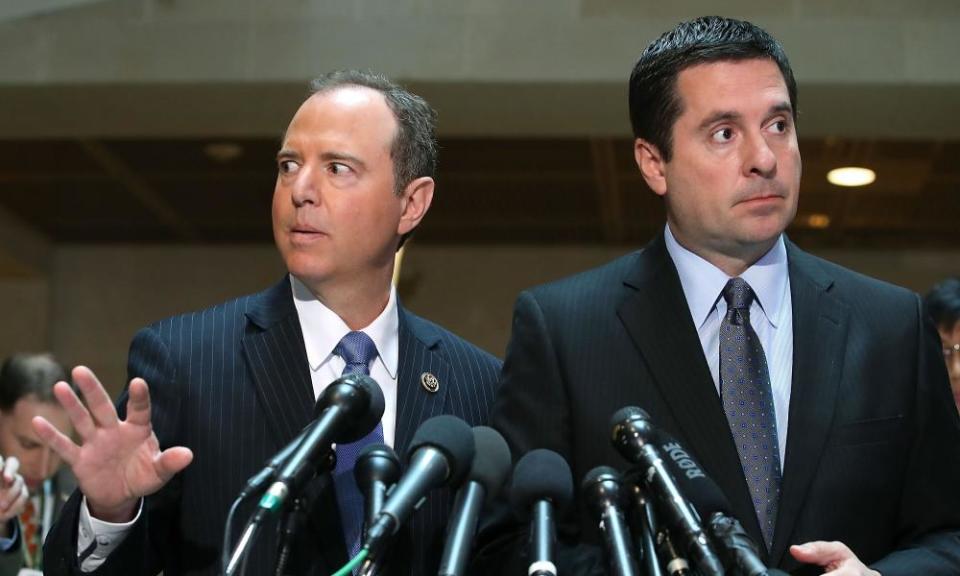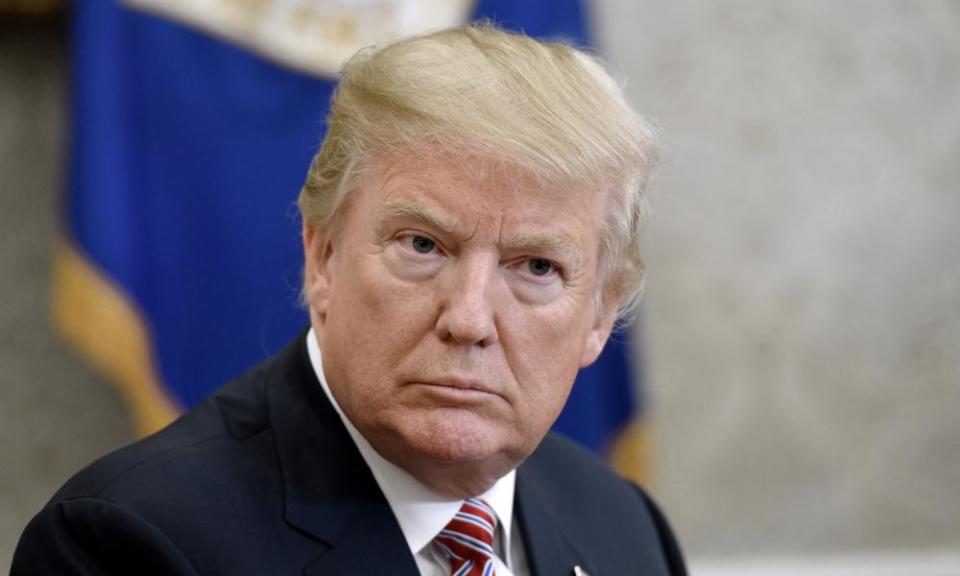Trump blocks Democrats' rebuttal to Nunes memo, citing national security
White House says document, a response to a Republican memo alleging FBI misdeeds in the Trump-Russia inquiry, cannot be released due to ‘classified and sensitive passages’

Donald Trump is blocking the release of the Democrats’ rebuttal to a Republican memo that accused the FBI of a politically biased investigation into the president’s ties to Russia.
Donald McGahn, the White House counsel, released a letter Friday night arguing that disclosure of the Democrats’ memo would “create especially significant concerns for the national security and law enforcement interests” and claiming that Trump was “inclined to declassify” the document, but could not at this time due to “classified and especially sensitive passages”.
Democrats on the House intelligence committee, which is investigating Russian meddling into the US election, authored the new memo, which they said provided context for a four-page memo authored by Republican Devin Nunes, a close ally of Donald Trump.
The memo was written by aides to Devin Nunes, chairman of the House intelligence committee and a member of the Trump transition team.
The committee is investigating Russian interference in the 2016 election but the inquiry has devolved into a fight about the separate FBI investigation, now led by special counsel Robert Mueller.
On Friday, Nunes published the memo after Donald Trump declassified it.
The memo revolves around a wiretap on Carter Page, an adviser to the Trump campaign, alleging the FBI omitted key information when it applied for the wiretap. The findings “raise concerns with the legitimacy and legality of certain DoJ and FBI interactions” with the court that approves surveillance requests, the memo says. It also claims “a troubling breakdown of legal processes established to protect the American people from abuses”.
The memo criticizes investigators who applied for the wiretap, saying they used material provided by an ex-British agent, Christopher Steele, without sufficiently disclosing their source. The memo says Steele was “desperate that Trump not get elected”.
The memo also says texts between an FBI agent and FBI attorney “demonstrated a clear bias against Trump” and says there is “no evidence of any co-operation or conspiracy between Page” and another Trump aide under investigation, George Papadopoulos.
The memo casts deputy attorney general Rod Rosenstein in a negative light. Rosenstein could fire Mueller. The president, said to dislike Rosenstein, could fire and replace him.
The FBI argued against the memo’s release. Democrats wrote a rebuttal and sided with the bureau. The president reportedly told associates he believes the memo will help discredit the special counsel.
Alan Yuhas
The GOP memo, released last week, claimed that the FBI and justice department obtained a surveillance warrant against Carter Page, a former campaign adviser to the Trump campaign, based on shoddy information provided by a former British spy, Christopher Steele. Trump has said the memo “totally” vindicated him.
The House panel voted unanimously to release the Democrats’ memo on Monday, giving Trump until Saturday to decide whether the information should be made public. On Friday afternoon, Trump had told reporters that the memo would be released “soon”.
But McGahn said the memo in its current form could not be released. His letter said that “given the public interest in transparency in these unprecedented circumstances”, the president had directed the justice department to assist the House committee if it wished to revise the Democrats’ memo to “mitigate the risks”.
The FBI director, Christopher Wray, and the deputy attorney general, Rod Rosenstein, also wrote on Friday that the disclosure could raise concerns about “intelligence sources and methods, ongoing investigations, and other similarly sensitive information”.
On Saturday, Trump tweeted:
The Democrats sent a very political and long response memo which they knew, because of sources and methods (and more), would have to be heavily redacted, whereupon they would blame the White House for lack of transparency. Told them to re-do and send back in proper form!
— Donald J. Trump (@realDonaldTrump) February 10, 2018
The Senate minority leader, Chuck Schumer, condemned the White House’s decision to block the Democratic memo on Friday, saying in a statement: “The President’s double standard when it comes to transparency is appalling. The rationale for releasing the Nunes memo, transparency, vanishes when it could show information that’s harmful to him. Millions of Americans are asking one simple question: what is he hiding?”

The parties have accused each other of misrepresenting sensitive information related to the investigation into whether Trump associates colluded with Russia in an effort to sway the 2016 presidential election in the businessman’s favor.
The top Democrat on the panel, the California congressman Adam Schiff, accused Republicans of carrying out a “political hit job on the FBI in the service of the president” with the release of the GOP memo. On Monday, Schiff told reporters that the Democratic memo would correct the “distortions and inaccuracies” contained in the GOP memo.
On Friday, Schiff said the Democrats took security concerns seriously and looked forward to finding a way to “inform the American people about the misleading attack on law enforcement by the GOP”.
House Democratic leader Nancy Pelosi accused the president of “a stunningly brazen attempt to cover up the truth about the Trump-Russia scandal” while Senator Richard Blumenthal said the decision to block the memo made a “mockery of national security and common sense” and was “evidence of obstruction of justice by Donald Trump”.
Nunes, the chairman of the House intelligence committee and a former member of Trump’s transition team, has accused Democrats of trying to cover up an abuse of power by the FBI and the justice department. He told Fox News recently: “These guys tell so many lies, you can’t keep track of them.”
Trump had authorized the Republican memo to be made public and has repeatedly denounced the investigation into Russian election interference as a “witch-hunt”.
But elected officials in both parties have said that the GOP memo failed to clear Trump of obstruction of justice or collusion – two lines of inquiry at the heart of the Russia inquiry. Before Trump approved the disclosure of the memo, the FBI said it had “grave concerns” about omissions that impacted the report’s accuracy.
Beyond Mueller
Three separate congressional committees are investigating Russian tampering in the 2016 presidential election and possible collusion between Russia and the Trump campaign: the Senate judiciary and intelligence committees, and the House intelligence committee.
The committees have the power to subpoena witnesses and documents. The list of witnesses to have been interviewed so far is long, and includes Donald Trump Jr and Jared Kushner, as well as lesser figures such as former adviser Carter Page; Glenn Simpson, the co-founder of Fusion GPS, which commissioned the Steele dossier; and Ben Rhodes, the former Obama adviser.
Senate intelligence committee
The most aggressive of the three committees so far, with a reasonable appearance of bipartisanship. Republican chairman Richard Burr of North Carolina said in October that the question of potential collusion between the Trump campaign and Russian operatives remained open. But Burr has also said the committee was not focused on “criminal acts” but a larger picture. The committee notably heard testimony from James Comey after the former FBI director was fired.
Senate judiciary committee
Hampered early on by partisan disagreement about the scope of its investigation, the committee has interviewed top witnesses including Donald Trump Jr and has taken a particular focus on the firing of James Comey. But the committee has deferred to Mueller in the investigation of Paul Manafort and has interviewed fewer witnesses than others.
House intelligence committee
Riven by partisan conflict, the committee appears to be on track to produce two reports – one from each party. Chairman Devin Nunes recused himself from the inquiry in March after Trump tweeted that Barack Obama had "tapp[ed] my phones" and Nunes, in an apparent attempt to defend the president, revealed that some communications involving Trump aides had been intercepted by US surveillance programs.
Two former Trump aides, including his first national security adviser, have pleaded guilty and are cooperating with prosecutors. Paul Manafort, Trump’s former campaign chairman, faces multiple felony charges including fraud and failing to register as a foreign agent.
Speculation has continued to swirl suggesting Trump may fire the special counsel Robert Mueller, who is overseeing the Russia investigation. In June 2017, Trump asked his general counsel to fire Mueller, according to a report in the New York Times.
The House committee, in contrast to a more harmonious parallel investigation in the Senate, has been plagued by partisan rancor, devolving into a bitter fight over the role of the FBI and justice department.
The acrimony reached new heights this week, when CBS reported that Republicans on the committee plan to erect a physical partition between Republican and Democratic staff members in the committee’s secure spaces.

